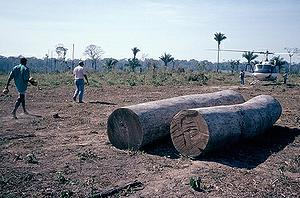BRASILIA, Brazil, September 30, 2008 (ENS) – A Brazilian government agency that provides land to settlers is the largest illegal logger in the Amazon rainforest and could face criminal prosecution, Environment Minister Carlos Minc said Monday. Minc blamed Institute of Colonization and Agrarian Reform, or Incra, for occupying the top six places on a new government list of the 100 largest illegal loggers.
Today, he backed off a little, giving another government agency 20 days to analyze information presented by Incra contesting the legality of the deforestation.
 |
Illegally cut logs await transport from a clearing in the Brazilian rainforest. (Photo by Andy Revkin) |
“As some questions had been raised about what is legitimate, Ibama will go to evaluate point the point,” Minc said, handing responsibility for the inquiry to the Brazilian Institute of Environment and Renewable Natural Resources, or Ibama.
Minc clarified that Incra is the formal owner of the six parcels of land at issue, which in fact were deforested by the settlers. But legally, he said, the problem falls again on Incra because the Institute cannot pass ownership of land to the agriculturists until it has been settled for 10 years.
“They are small deforestations, of 20 or 30 hectares, per person. On the other hand, a small one deforests little but thousands deforest a great deal,” said Minc. “Therefore, we have that to improve, and as well we have to improve the incidents of deforestation on conservation units and on aboriginal lands.”
In total, 223,000 hectares of the rainforest were logged on those six properties
The Amazon rainforest is being chopped down more than three times as fast as last year, Brazilian officials said Monday, after three years of declines in the deforestation rate.
 |
Logging truck in Mato Grosso state (Photo by Alex Robinson) |
Minc blamed upcoming nationwide elections, saying that mayors in the Amazon region are ignoring illegal logging in hopes of gaining advantage at the polls.
He said all illegal loggers on the list, public and private, will have to answer to the Department of Justice, replant what was deforested and change their attitude. “Most important is a change of attitude, to stop logging illegally with impunity and to reconstitute what it was deforested by the crimes,” declared Minc.
According to minister, most of the deforestation has taken place in the states of Pará, Mato Grosso and Rondônia.
Today, Minc announced 12 actions his ministry will take to combat illegal logging.
First, he will distribute the list of the 100 largest illegal loggers and create a task force involving the Ministry of the Environment, General Law of the Union and Federal Public Prosecution Service to analyze the actions of those cited on the list.
Minc said he plans to create a federal force to fight environmental crimes with 3,000 armed agents under Ibama who will act to deter illegal logging.
 |
Brazilian Environment Minister Carlos Minc introduces two of the Ibama agents who will fight environmental crimes. September 30, 2008 (Photo courtesy Office of the Minister) |
He announced plans to chase illegal loggers out of the national forests of Rondônia in the second fortnight of October.
He will stimulate the state of Amazonian to produce its plan to combat deforestation to guarantee preservation of “Deep Amazônia.”
Minc said he will use a donation of 6 million euros from the European Union and an equivalent amount from the Brazilian government to implement a limited-use Forest District along the unpaved BR-163 highway.
The controversial Santarém-Cuiabá (Br-163) highway has been called the soy highway, as its proposed paving would link Brazil’s expanding monocrop export to a deep-water port in the Amazon.
Minc said he intends to create a work group to define conservation units along the BR-319 highway from Manaus to Porto Velho.
Source: Environment News Service